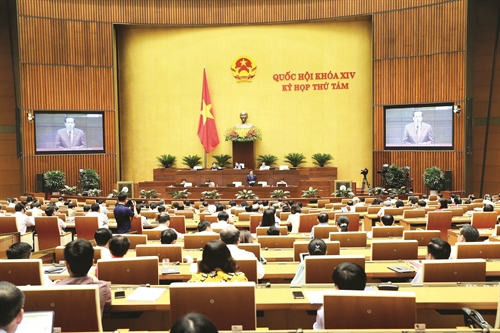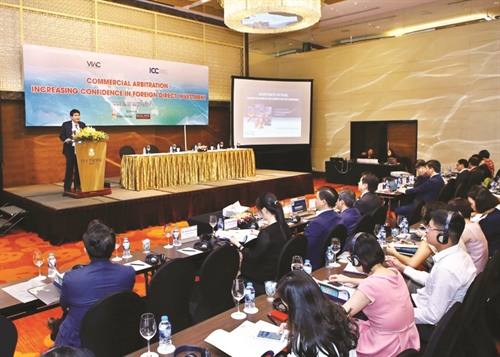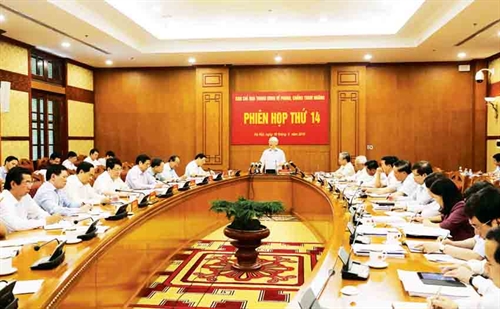The Fourth Industrial Revolution helps create new products and services as well as business models in an open atmosphere without any distance between the reality and cyber space. However, Vietnam’s existing legal framework still fails to meet the demand for realizing these products, services and models. It is not yet mature for the application of novel forms of raising funds from angel investors or venture investment funds. So far, there is no legal corridor for innovative startups, particularly fintech ones. This article introduces new fundraising channels and their legal challenges and puts forward recommendations for formulating a regulatory sandbox applicable to these channels.
Chu Thi Hoa, LL. D
Deputy Director of the Institute of Legal Science Ministry of Justice
Emergence of new fundraising channels
Initial coin offering (ICO), security token offering (STO), initial exchange offering (IEO), and even initial dex offering (IDO) are instruments used by technology startups to raise funds. These instruments serve as a bridge between finance and blockchain technology. Over the recent time, limitations revealed in ICO lead to the emergence of STO and IEO. The cryptocurrency community has witnessed strategic changes in fundraising trends year after year, with ICO booming in 2017, STO growing in late 2018, and IEO boosted in 2019 when a new wave arises for crypto businesses to make their tokens’ debut.
Since its emergence in 2013, ICO has helped startups raise billions of US dollars. In 2017 alone, startups, via this channel, raised USD 1.6 billion; particularly, in August this year, Filecoin project attracted USD 252 million after some 30 minutes from certified investors only. In 2018, around USD 8 billion was mobilized through 1,253 ICOs.[1] Comparing initial public offering (IPO) with ICO, it can be seen that by IPO investors may own stocks a company has initially sold to the public, while with ICO they will receive cryptocurrencies issued based on blockchain platforms. These cryptocurrencies are those used in investors’ projects and may be traded like a speculative asset expected to have an increasing value when these projects succeed. Another difference between IPO and ICO is that IPO is subject to strict control by the Securities Commission while the control of ICO is rather “loose”.[2] Also, before IPO, a company is required to disclose its audited prospectus while issuers in ICO are only required to produce their white papers showing their projects’ development ambitions.
In late 2018, when ICO became disreputable with many swindling cases, STO was expected to become another effective fundraising form. However, despite of having real assets in transactions, STO still encounters barriers to entry and becomes infeasible for almost all projects as fundraising via STO is closely managed like IPO.
The year 2019 is witnessing a trend of fundraising through IEO. With this fundraising model, startups use cryptocurrency exchanges to raise funds and have to pay charges for having their stocks listed and a percentage of tokens sold. So, the relationship between startups and bitcoin exchanges is for mutual benefit as these exchanges assist startups in marketing and advertising. In essence, IEO is ICO plus interventions and new regulations aiming to ensure that the involved entities face fewer risks. However, IEO has been proved to be a reasonable makeshift solution between ICO and STO.[3] With ICO, partners are developers that sell tokens directly to investors. In the meantime, with IEO, startups may base themselves on one or more than one exchange to complete their fundraising campaigns. The exchanges will permit smart contracts to accept money for exchange for tokens. Within an IEO, investors will deposit money into wallets or smart contracts, then sellers will send tokens to users.
Following STO, IDO is expected to be the evolution of IEO. They are similar with a slight difference that IDO is carried out on decentralized exchanges (DEX) while IEO is effected on centralized exchanges.
Thus, the fundraising mode and scale have seen rapid changes year after year. Nevertheless, Vietnam’s current laws have no regulations on fundraising through ICO, STO, IEO and IDO or digital asset exchanges. This forces Fintech startups make offshore investment.
 |
| A national symposium titled “Industry 4.0 and legal issues involving the formulation and improvement of Vietnam’s legal system” held by the Ministry of Justice on June 24__Photo: https://moj.gov.vn |
Reality shows that many enterprises are founded by Vietnamese and operating in the country but register their business operation in Singapore.[4] With such advantages as simple procedures for company establishment, tax exemption and reduction during the first years of operation, flexible startup ecosystems with mechanisms permitting the application of regulatory sandboxes, and great opportunities for capital attraction, Singapore has become an attractive destination for foreign startups, including Vietnamese ones. Since 2015, many Vietnamese startups have sought to establish their branches in Singapore while their key staff members still work in Vietnam. Their Singapore-based branches operate as just legal person representatives with tiny offices and little personnel for the cost-saving purpose only, while important tasks are performed by human resources in Vietnam. Nevertheless, to date no official statistics on the number of Vietnamese startups registering business in Singapore have been made. Vietnamese startups also seek investment in other regional countries like the Philippines and Thailand.[5]
Over the recent years, Vietnamese innovative startups have not only provided new services but also applied new fundraising methods with millions of US dollars mobilized. For instance, KyberNetwork, a firm founded in Singapore with a Vietnamese citizen acting as the executive officer and co-founder, started an ICO in this country on September 22, 2017. After several hours, this project has raised around USD 52 million, making KyberNetwork the biggest commercial transaction in Vietnam’s history of startups and be on par with the world’s 10 leading startups in the mobilized amount in 2017.[6]
Another example of success in fundraising is Tomochain, a Vietnamese blockchain startup registered in Singapore. This startup has raised USD 8.5 million.[7] It has Vietnamese engineers accounting for 90 percent and provides applications to over 90 percent of international customers but has to choose Singapore to locate its head office. This is because this country has an adequate legal framework supporting the attraction of international investment capital.[8]
Why is a regulatory sandbox needed in Vietnam?
The successes seen in the UK, Switzerland, China, the Netherlands, the United Arab Emirates, Malaysia, Hong Kong, Australia, Canada, Singapore and Brazil, etc., with a total of 50-plus countries having developed regulatory sandboxes show that a regulatory sandbox seems to be the most appropriate in Vietnam in order to promote innovation, reduce or remove legal hindrances, or formulate a new regulation.
Though evaluated as a country with all conditions to become a blockchain application center of the world, Vietnam still lacks an appropriate legal framework. This makes it impossible to take full advantage of this technology platform.[9] Vietnam cannot fall behind as innovative activities and new business models are daily realities in the country, while many Vietnamese companies have to “refuge” to other countries or operate in Vietnam in other forms.[10] With over 3,000 innovative businesses, Vietnam is ranked third in Asia but many Vietnamese enterprises, even with the number larger than the above figure, have registered business in foreign countries that have complete legal systems, such as Malaysia, Singapore, Malta, Hong Kong and some European countries. In these countries and territories, regulatory sandboxes have been established for creating an atmosphere for innovative enterprises to pilot their new products, services or business models. The increasing social and economic impacts of startup communities with their capital amounts and effects on the public require the immediate involvement of the Government. Pending the issuance or revision of relevant laws, Vietnam may consider enacting a decree regulating the model of regulatory sandbox.
From the legal perspective, a regulatory sandbox may be defined in the most general manner as follows:
Regulatory sandbox is a separate legal framework (which is beyond the current legal framework). It is a novel and flexible approach in lawmaking techniques which allows the pilot application of innovations under control in a given period. It requires appropriate security measures to prevent possible consequences of its failure without greatly affecting the national financial system. Upon the expiration of the pilot period, if a startup succeeds, it will have to operate under the current legal system instead of the regulatory sandbox.[11]
Subject to the regulatory sandbox are innovative financial instruments, technology-applied products and new business models. Regulatory sandboxes applying to technology-applying startups (such as fintech and blockchain ones) or enterprises realizing new business models (models of sharing economy) will be implemented in a definite space and period. However, these regulatory sandboxes might fail so their pilot application should be coupled with appropriate security measures to protect the national financial system.[12]
There are many reasons for the formation of a regulatory sandbox, one of which is the requirement to promote competition and raise efficiency in financial service markets through innovation initiatives. With existing managerial experience and capacity in Vietnam, a regulatory sandbox to be applied within a restricted scope is a good suggestion.
Recommendations
Firstly, a regulatory sandbox is really needed for fintech businesses in general and innovative startups involved in blockchain and cryptocurrency in particular. Therefore, it is proposed that the Government directs related ministries and sectors to form teams to study the model of regulatory sandbox. These teams should collaborate with specialized units in proposing specific tasks. For instance, the banking sector would put forth fundraising tasks with the application of blockchain technology, while the Ministry of Finance, State Securities Commission (SSC) and securities companies should give questions about exchanges, etc.
Secondly, in the immediate future, Vietnam should formulate a regulatory sandbox applicable to forms of raising funds for businesses via digital asset exchanges, which are similar to IPO and regulated by the laws on securities and foreign exchange management.
Only with it, may startups raise funds from investors in the market through offering their tokens based on blockchain platforms. The holding rate of tokens will correspond to benefits earned by investors from a project. Since this activity is similar to IPO, the issued tokens function like securities and serve as valuable papers expected to bring about profits to investors. So, the SSC may be assigned to take charge of managing the issuance of digital assets and grant of licenses for carrying out digital asset-related activities. It should be noted that fundraising in this form may only apply to investors that fully satisfy the conditions set by the SSC (not all investors).
Thirdly, it is suggested that cryptocurrency exchanges be established under the state management to ensure safety for money depositors and recipients, because through such exchanges, involved entities may collect money transfer charges, value-added tax, corporate income tax and personal income tax. The state management would also help supervise transactions and prevent money laundering. The cryptocurrency exchanges should be registered like enterprises so that state authorities could settle incidents, if any. At first these authorities would permit limited transactions (e.g., limiting the number of tokens to be traded), then consider extending transactions.[13]
Fourthly, a state-managed exchange for crypto assets by the modes of ICO, STO, IEO and IDO could also be developed as a startup project with founders being state budget-financed investment funds, technology businesses and state management agencies providing legal counseling services, and independent audit firms coordinating with institutions in charge of safety inspection and information confidentiality.[14]
Fifthly, for innovative startup activities, the Government should provide support for startup consultancy centers and incubators. For investment activities, a regulatory sandbox would help startups register business and access funding sources and, at the same time, protect investors and create a healthy business environment in order to prevent unexpected consequences and violations in the operation of fintech businesses.
The Government should also consider building special technology zones or special innovation zones where special mechanisms may be applied on a pilot basis to industrial businesses.[15]-









